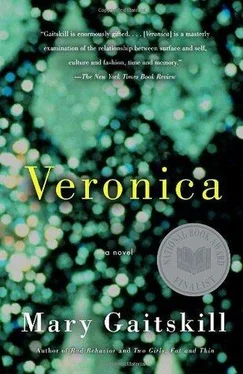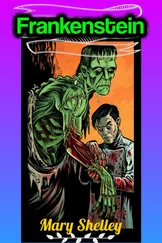His name was Jamie. His soft voice was desiccated and voluptuous at once. He said he was in his room because it was his roommate’s party and he didn’t expect to be interested in anyone there, and besides, he was shy. A fragile system of model airplanes hung from the ceiling over his bed, casting soft, gently stirring shadows. “These are beautiful,” I said. I reached up to touch one; shyly, the system dipped and bobbed.
“Skipper likes you,” he said.
We left the party and went for a walk. On the bottoms of his severely pointed shoes, Jamie wore cleats, which clicked loudly on the pavement. The only people I’d ever known to wear cleats were middle-school boys, who wore them so they could kick hard and make a lot of noise when they walked. I asked Jamie why he wore them, and he said, “I just like them.” His words were modest, but they whirred with secret importance. He said everything that way. The British monarchy was very important; Prince Charles’s recent marriage was particularly so. Ornette Coleman was the only good jazz musician. He approved of men’s shoes on women. He approved of Buckminster Fuller and Malcolm McLaren. He approved of Bow Wow Wow.
His opinions were frivolous, fierce, and exact. He worked in a small graphics plant that made logos and labels for sundry products. But he was as proud and particular as any Parisian playboy. His favorite logo was the brand name of a line of white paper sacks commonly used by small grocers; I had never noticed, but TORNADO was printed in brown letters with a vibrant round T at the top of each bag. “It’s so elegant,” he said, and it was .
When I told him I had to go to work, he asked if he could see me again, and I said yes. He hailed me a cab and I got into it even though I could only afford to take it to the nearest subway.

I think of Jamie and silliness pops out of the ground in the form of a California hazelnut, bearing its tasseled foliage on each slim branch. Amid death and groaning wooden power and the wet complexity of moss and fungus and vines — from the same solemn pit, silliness pops up to dangle its tassels. Jamie. Alain. Joanne. We all came up out of the ground and took our forms. So much harder for us to have a form because we have one on the outside and too many inside. Depth, surface, power, fragility, direction, indirection, arrogance, servility, rocks, roots, grass, blossoms, dirt. We are a tangle of roots, a young branch, a flower, a moldy spore. You want to say, This is me; this is who I am. But you don’t even know what it is, or what it’s for. Time parts its shabby curtain: There is my father, listening to his music hard enough to break his own heart. Trying to borrow shapes for his emotions so that he may hold them out to the world and the world might say, Yes, we see. We feel. We understand. I touch the hazelnut bush gently as I pass.
I saw Jamie again and we went for another walk. We bought tinned sardines and potato chips and candy, then went back to his apartment to eat. His roommates weren’t home. We finished our dinner and talked until it was so dark, we could see each other only as dim shapes. Jamie didn’t turn on the light. Shadow airplanes appeared and disappeared as headlights swept the wall. “Would you like to take a bath together?” he asked.
In the claw-foot bathtub, I sat between his legs while he held me from behind. Out a low half-moon window was the back of an abandoned building and a piece of illuminated street: the deep gray stone of the building stippled with scars and holes, squares of sidewalk, a lip of curb, a groove of gutter, the melancholy gray of the street. On the street a dog came trotting, chin raised and tail up, all brisk paws, ears, and snout. Jamie laughed; laughing, I turned and he held my face in his wet hands and kissed my forehead, then my closed eyes.
He was gentle in a way that I had not experienced before. He touched me intimately but also somewhat impersonally. He was polite, yet dirty, too. He was covered with soft black hair, which seemed at odds with his sleek habits of dress; with his clothes off, he revealed his nature, without any cleats or clothes to hold it up, and it was wonderful to see, like the coarse little dog prancing down the street.
“You should model,” he said. He was lying on top of me, feeling my eyebrows with his lower lip. “You could make money.”
“I already did,” I said. “I didn’t like it.”
“Class,” he said warmly. “You have class.”
But I was lying.
Candy didn’t like Jamie because he was affected and because he was short and cold with her. “He makes such a big deal out of himself — those stupid cleats and that toy dog — and I don’t think there’s anything there.”
But that wasn’t true. There was something “there.” Something so scornful that it willfully stunted itself just to withhold itself; something so scared that it blindly clung to objects like toys and cleats, pitifully trying to blossom, jealously nursing its own pathos and mocking it, too.
“It’s glamour in its purest form,” said Veronica. “I approve.”
She spoke of fey youths she had known, of their clothes and hair, the petulant swing of their slim hips. Of one who tried to kill himself with pills and wound up curled in a corner of her apartment, alternately sobbing in her lap and barfing in her wicker basket.
“It’s so moving, that artificiality,” she said, “moving and wistful. Of course there’s something there; unfortunately, there’s always something ‘there.’ Something you will one day be sorry you ever saw. But my advice to you, hon, is not to go looking for it. You’ll see it eventually.” She exhaled a noseful of smoke. “Probably in your nice wicker basket.”
Of course, she was wearing men’s shoes. She was also wearing a cable-knit sweater with raised colored animal shapes knit into it: a cat, a dog, a rooster. Red, green, and orange on peach. Frivolous, exact, and fiercely ugly.
In September, the sublet with Candy ended. I found a new sublet, a tiny apartment in the West Village; I used the last of my French money for the deposit. It was a studio with a stove, a refrigerator, and a sink on one wall and a bed on the other, both walls boxed in by a window on one end and a closet on the other. The window was protected by a metal grid that had gotten stuck shut; to open it, I had to poke a broom handle through one of the grid’s diamond-shaped gaps, manipulate the latch with it, and nudge the window open. Not much sun came in, but when it did, it made a wobbling grid of diamonds on the floor.
When Sheila came to visit from New Jersey, she said, “God! You have to do that every time you open the window?” She told me Lucia was pregnant again. She told me she had been promoted to store manager. We went to Central Park, where we rented a rowboat and rowed on the lake. She let her hand trail in the water and her face grew wistful and luminous. Her face was tense for a twenty-year-old girl. Heavy like her will was pushing down, trying to crush something deep inside her, tense like the crushed thing was pushing back. I thought, She is ugly already. As if she heard me, she frowned and drew her hand from the water. “Did you know Ed is seeing Denise?” she asked.
I didn’t see Sheila or Candy again. I saw Jamie every night I could. We would go for walks and buy our dinner to take back home and eat. Sometimes he would take me to secondhand stores in the East Village and tell me what clothes to buy. Sometimes we would go to clubs and meet his friends, people with changeable hair and light, pointedly civil manners. One of them, a pleasant blond named Eric, with the faintly impossible air of someone who had never been hurt, told me I was stupid not to model. He worked at a magazine made up almost exclusively of pictures of models and actors. “Nobody likes it,” he said. “It doesn’t matter; you only do it a few years and make a lot of money.” When I told him about Alain, he scoffed.
Читать дальше













